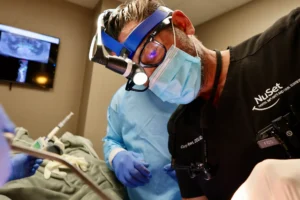Dental implants are designed to feel natural and comfortable. But what if you notice some sensitivity around the implant site? Is this just a sign of the implant site healing?
The good news is that implant sensitivity is usually not a serious problem. In most cases, it can be managed with simple solutions. If your implant feels sensitive, it’s important to understand what’s causing it and what you can do to relieve it.
At NuSet Dental Implants and Oral Surgery, we help patients feel comfortable and confident in their implants. If you have any concerns about sensitivity, we’re here to help.
Key Takeaways
- The dental implant site may be sensitive during healing but should improve over time.
- Infection, gum irritation, or a loose crown can cause sensitivity.
- Sensitivity to temperature may be due to gum or bone tissue, not the implant itself.
- If sensitivity lasts too long or gets worse, your implant specialist should check it.
- NuSet Dental Implants and Oral Surgery provides expert care to keep your implant comfortable.
What Causes Sensitivity in Dental Implants?
Dental implants are designed to feel like natural teeth. But if yours feels sensitive, something may be irritating the area around it. Here are the most common causes and what they mean for you.
Healing Process
A little discomfort after getting an implant is normal. Your body is adjusting, and the surrounding gums and bones are still healing. You may feel some tenderness, especially when eating or brushing near the area. This usually improves as your body recovers.
Infection or Inflammation
Healthy implants won’t cause you any pain. It is possible that bacteria builds up around the implant site, especially if oral health isn’t prioritized. This bacteria build up, like in natural teeth, can cause an infection.
Signs include redness, swelling, tenderness, or a bad taste in your mouth. Ignoring this can lead to other problems, so if you notice any of these signs, get it checked. The sooner it’s treated, the easier it is to fix.
Improper Bite or Alignment Issues
If your implant isn’t aligned properly, it may put uneven pressure on your teeth. This can cause discomfort when biting or chewing. A simple adjustment from your specialist can fix this and bring back your comfort.
Temperature Sensitivity
If you feel discomfort with hot or cold foods, it may be because the area around the implant is irritated. Gum recession, thin tissue, or slight inflammation could be the cause. A specialist can help identify what’s happening and recommend ways to protect the area.
Implant Crown or Restoration Issues
The implant itself is a post (metal or ceramic) in your jawbone, but the visible tooth is a crown attached on top. In rare cases the crown is too high, loose, or doesn’t fit properly, it can cause sensitivity. A loose crown may let bacteria in and cause irritation.
Sensitivity in dental implants is uncommon, but it can happen. The good news is that most causes are easy to manage. If your implant feels uncomfortable, don’t ignore it. Getting the right care early can prevent issues later.
How to Manage and Alleviate Sensitivity in Dental Implants
If your dental implant feels sensitive, there are simple ways to reduce discomfort and protect the area. Here’s what you can do to feel better.
Follow Post-Operative Care Instructions
Taking care of your implant from the start helps prevent problems. Follow your dental specialist’s instructions, especially right after surgery. They want to help you heal comfortably.
Take Mild Pain Relief (If Needed)
If sensitivity makes eating or brushing uncomfortable, an over-the-counter pain reliever can help. If the discomfort doesn’t go away, check with your specialist, they may need to adjust the implant or the crown.
Stick to Softer Foods
Crunchy or chewy foods can put pressure on the implant site. If the implant site is feeling sensitive, choose softer foods for a few days. This gives your mouth time to rest and feel better. Foods like yogurt, mashed potatoes, and scrambled eggs are gentle on your gums and easy to eat.
Use Ice Packs for Swelling
If the area feels sore or slightly swollen, an ice pack can help. Hold it on your cheek for 10-15 minutes at a time. This can reduce discomfort and make the area feel more comfortable.
Most implant sensitivity can be managed at home. But if it lasts too long or keeps coming back, a quick visit to your specialist can help. A simple adjustment or cleaning may be all you need to feel good again.
When to Contact NuSet Dental Implants and Oral Surgery for a Sensitive Dental Implant

Mild sensitivity is usually a sign that your implant is still healing. If swelling persists or worsens, it’s best to check with a specialist. Here are a few signs that it’s time to schedule a visit:
- If your implant feels sensitive for more than a few days or the discomfort increases over time.
- If you notice swelling, redness, or an unusual taste in your mouth.
- If your implant doesn’t feel quite right when you bite down, the alignment may need a small adjustment.
If you’re unsure whether your implant sensitivity is normal, don’t wait. Let’s get it checked and make sure everything is right with your smile. A short visit can give you peace of mind and ensure your implant stays in great shape.
Prevention Tips to Avoid Sensitivity After Dental Implants
A few daily habits can help prevent sensitivity and keep your implant feeling just like a natural tooth. Here’s what you can do to protect it.
Maintain Excellent Oral Hygiene
Your implant doesn’t get cavities, but the gums around it still need care. Brush twice a day with a soft-bristled toothbrush and use a water flosser gently around the implant. This keeps your gums healthy and prevents irritation.
Schedule Regular Check-ups
It’s said that you should see a dentist twice a year. When in doubt, this is a good rule of thumb to follow. Routine visits to your dentist help catch small issues before they become bigger concerns. Your specialist will check that your implant, crown, and gums are all in great shape. If there’s any early sign of irritation, they can fix it right away.
Avoid Hard or Sticky Foods
Your implant is built to last, but chewing on very hard foods (like ice or hard candy) can put extra pressure on it. Eating a balanced diet and avoiding extreme food textures will help your implant stay comfortable.
Why Choose NuSet Dental Implants and Oral Surgery for Your Implant Care?
Your dental implant should feel strong, natural, and comfortable. If you ever have concerns, you deserve a team that listens, cares, and knows how to help. With us, you get to experience and enjoy the following:
Experienced Professionals Who Get It Right
Dental implants require skill and precision. Our dental implant specialists have years of experience placing and restoring implants. Whether you need a simple check-up or a small adjustment, we make sure your implant fits perfectly and feels great.
Personalized Care for Every Patient
No two smiles are the same, and your care shouldn’t be either. We take the time to understand your needs and create a plan that works best for you. If your implant feels sensitive, we don’t just offer quick fixes—we find the real cause and make sure you’re comfortable.
Commitment to Your Comfort
Getting a dental implant is an important step. We want you to feel confident and at ease from start to finish. Whether you’re here for an implant, a check-up, or a question, we provide care that makes you feel valued and supported.
If your dental implant feels sensitive or you want expert advice, we’re here for you. Contact us now to get started!
Frequently Asked Questions
Is it normal for dental implants to be sensitive?
Dental implants don’t have nerves so they usually don’t feel sensitive. However, mild discomfort around the implant site can sometimes happen, especially during the healing process. If the sensitivity lasts or gets worse, it’s best to have your dentist check it.
How can I tell if my dental implant is infected?
An infection around your implant may cause redness, swelling, or tenderness in the gums. You might also notice a bad taste, minor bleeding, or sensitivity when eating. If you experience any of these symptoms, contact your dentist for a quick evaluation. Treating it early can help keep your implant healthy.
Is it normal for tooth implants to hurt years later?
Dental implants are designed to last and should not cause pain over time. But if you feel discomfort years after getting an implant, it could be due to gum recession, changes in your bite, or a minor issue with the crown. A simple check-up can identify the cause and keep your implant in great shape.
Why is it sensitive when I put pressure on the implant?
If your implant feels sensitive when you chew or bite, it may be due to uneven pressure, a loose crown, or slight gum irritation. A quick adjustment by your dentist can help fix the issue and restore comfort.





